I have a Go project with the following structure:
foo/foo.go
foo/foo_test.go
main.go
As you notice, there is no test for main.go.
I collect the coverage report using the following command:
go test ./foo ./ -coverprofile=coverage.txt -covermode=atomic
Here ./foo and ./ show where to look for packages.
Problem: I send the coverage report to codecov.io which shows that my code is 100% covered with tests. But this is not true as my main.go has no tests at all.
It seems like the system only counts those packages that explicitly specify test files.
Question: How to fix the coverage report in the way that it will count information about untested packages?
Note: You can find my project on GitHub and the real statistic is here. The project has a different structure, but the issue persists (wrong coverage).


go test -coverpkg=.,./foo -coverprofile=coverage.txt -covermode=atomic . ./foo– Tentation